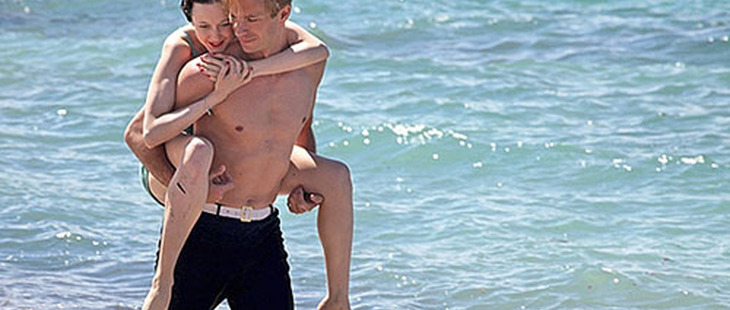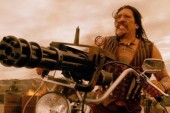
W.E. The truly terrible thing about Madonna’s latest directorial effort is that it isn’t terrible enough. After W.E. was laughed out of the recent Venice Film Festival, I was hoping for a new camp classic, but instead it’s a plodding, “classy” affair with just enough flagrantly awful touches to keep you from going unconscious. Some of the silliest moments come from Madonna’s efforts to link two tenuously related storylines–one about the notorious affair between Lady Wallis Simpson and King Edward VIII, which caused the latter to abdicate the throne, and one about Wally, a modern-day New Yorker who endures romantic trials of her own while obsessively researching the royal couple. At regular intervals, Lady Simpson (Andrea Riseborogh) appears out of nowhere to compare notes with Wally (Abbie Cornish), and their conversations are so blandly prosaic they’re like two girls in a typing pool having smoke-breaks together. (“How’s your day, Maude?” “Fine, Shirl, how’s yours?”) In the end, it’s hard to guess what Madonna was going for with the aimless modern-day material, but the impulse behind the historical stuff is all too transparent. She wants to show how Lady Simpson was unfairly punished for her brazenness, her sexuality, and her basic American-ness. And that’d be fine, except she never makes her case. She just ladles pity for Lady Simpson over every scene like a thick gravy, assuming we’ll feel the same way she does. Meanwhile, when someone brings up Lady Simpson’s possible Nazi affiliations, another character settles the matter by replying: “That’s all just rumor!” That’s not rumor, actually, it’s drama, and if Madonna had explored her subject instead of lionizing her she might have had something halfway worth watching. A Dangerous Method David Cronenberg’s latest, about the relationship between Jung and Freud (Michael Fassbender and Viggo Mortensen, respectively), is highly enjoyable while you’re watching it, but it doesn’t come to enough. The screenwriter, Christopher Hampton (who adapted his own play, The Talking Cure), seems to be writing two different films: one about the professional friendship/rivalry of Jung and Freud, and another about Jung and Sabina Spielrein (Keira Knightley), the unhinged medical student he treated and then (in this telling, at least) had an affair with. As it is, the two strands never quite gel, and because the scenes between Fassbender and Mortensen are so adroitly performed–with some of the most amusingly civilized sparring you’ll ever see–you may find yourself wishing for less of Knightley’s character. She tries too hard to make Spielrein’s madness palpable; her frequent stammering is so violent it’s more like outbursts of Tourette’s. And though her performance improves as the film goes on, her character becomes less interesting as she regains her sanity. Ultimately, the real drama is in the rupturing of Jung and Freud’s relationship, but it comes too late and is treated too glancingly. Cronenberg and cinematographer Peter Suschitzky give turn-of-the-century Vienna and Austria a sun-dappled, robust glow befitting an era of nascent scientific discovery, but the latter half of the film could have conveyed more of the encroaching gloom of the First World War (which Jung obliquely references near the end). Ultimately–and I can’t believe I’m saying this about a Cronenberg film–A Dangerous Method contains too much sunshine, too little danger. We Need to Talk About Kevin I think the easiest response to Lynne Ramsay’s adaptation of Lionel Shriver’s novel – about a mother trying to come to grips with her son’s Columbine-like murder spree – is to try to poke holes in it. Yes, the son is something of a Bad Seed-style caricature; yes, the father (played by John C. Reilly) is too nave to be plausible; no, the “why?” of the son’s rampage is never adequately answered. But that would be to mistake the nature of the book and the film, which aren’t meant to be probing or even particularly realistic examinations of the growing phenomenon of school shootings. Those are just the horror trappings that draw us in. Instead, this is the blackest of comedies about how we all respond to the shallowness of modern life. Tilda Swinton plays the boy’s mother, Eva, a successful businesswoman and world traveller who never particularly wanted a child, but had one by accident anyway. When the boy arrives and effectively ends her old life, he detects her ambivalence and immediately decides to hold a permanent grudge over it. It’s a funny/scary scenario that will probably terrify women who are similarly unsure about motherhood. But it’s more than just a smart, modern update of Rosemary’s Baby. By the time the boy becomes a creepy-suave teenager played by Ezra Miller, it’s clear he’s not so much a character as a nightmare extension of Eva, who harbors her own largely unexamined feelings of fear and loathing towards North American life. Really, Kevin only differs from her–and any other educated person who’s ever felt disgusted by the modern world–by degree. Which isn’t to say this is another “we’re all to blame” screed. It’s more a nerve-shattering fun-house mirror, held up to our own increasingly fractured psyches for whatever parallels we can find. And it’s all executed with impeccable (if occasionally overweening) craftsmanship by Ramsay, given an eerie, subterranean score by Radiohead’s Jonny Greenwood, and anchored by Swinton’s perfectly modulated, hollow-eyed performance. Real cut-to-the-bone horror films don’t come along very often, so make time for this one. In Darkness Due to the gravity of the subject matter, films about the Holocaust always face good odds of acclaim, but is history really being served by yet another uninspired, “worthy” effort? Polish director Agnieszka Holland’s latest tells the true story of a Lvov man named Leopold Socha (Robert Wieckiewicz) who kept a group of Jews hidden in the city sewers for over a year, and while it contains some boilerplate suspense, it suffers badly from a lack of interesting characters. We’re introduced to the various Jews all at once, and they’re given exactly one identifying character trait apiece, which isn’t enough to sustain us through a nearly two-and-a-half-hour film. And Leopold’s slow transformation from mercenary savior-for-hire (he demands payment in return for his assistance) to actual savior follows the usual, uninspired beats. Holland’s fellow countryman Andrzej Wajda tackled similar material in his 1957 film Kanal, which dramatized the retreat of the Polish Resistance through the sewers of Warsaw. But in his film, shot in black and white, the sewers are a stylized, highly expressive depiction of hell on earth. In Holland’s film, they’re just dank and drably realistic, which merely exacerbates the monotony. Do yourself a favor: rent Wajda’s film instead. __ Brought to you by the Alliance Film, Warrior, in theatres September 9th.














